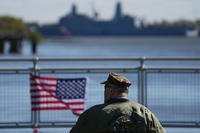AURORA, Colorado -- Guardians can expect the Space Force to roll out a pilot initiative for its health and wellness program as soon as next month, as senior leaders look to wearable technology as a potential alternative to traditional physical fitness tests.
Chief Master Sergeant Roger Towberman, the senior enlisted leader of the Space Force, said in response to a Military.com question that the service will roll out a pilot program "within the next 30 to 60 days" for its Holistic Health Approach, and Guardians can opt-in to try it out.
"I think we'll have something on the street, hopefully, within the next 30 days or so," Towberman said Tuesday at the Air and Space Force Association's Warfare Symposium. "It's taking time because we've got to get it right."
Read Next: Some Neck and Hand Tattoos OK for Airmen and Guardians Under New Policy Aimed at Helping Recruiting
Last year, Space Force leaders promised to unveil a revolutionary fitness program that would use fitness wearables -- similar to Apple Watches or Fitbits -- to help track exercise, diet and sleep instead of using a physical test like the other services have embraced for decades.
"Instead, I'll be able to sign up for a pilot that allows my fitness to be monitored regularly and, if I'm contributing, if I'm investing in myself like I'm supposed to, then I'm complying," Towberman said.
The Space Force wants to approach traditional physical fitness and health in a different way, service officials have said, mainly because its mission is very different from that of Marines, sailors, soldiers and airmen.
But, overall, very little about the progress and development of the Space Force's fitness plan has been shared publicly. In one small change, the program pitched in 2022 as the "Holistic Health Assessment" was rebranded as the "Holistic Health Approach" in January.
Military.com reported last year that there were worries among Guardians that the Space Force's new fitness program's data tracking would lead to micromanagement and punishment for not working out enough, despite being pitched as a nonpunitive program.
Guardians also expressed fears that their personal data could be used against them.
Wearables such as smart watches have raised privacy and security concerns throughout the military. In 2018, a Department of Defense memo asked service members in deployed areas and at high-profile bases not to use their fitness trackers for fear of revealing compromising location data to adversaries.
"The rapidly evolving market of devices, applications, and services with geolocation capabilities presents significant risk to DoD personnel both on and off duty, and to our military operations globally," the 2018 memo read.
Space Force officials have said that they don't plan to track GPS data, and that the data wouldn't be shared with other agencies.
Towberman reiterated those points Tuesday, saying that developing privacy precautions is one of the reasons why there has been a delay in getting the program to Guardians.
"People's privacy is important, protecting the data is important, and so there's just an amount of rigor here that's required," Towberman told Military.com. "We're being very careful, very deliberate as we walk through policy and what it looks like so that we can make sure that we do it right."
In January, the Space Force said that Guardians will not be required to take a fitness assessment in 2023 if they took one in 2022, until the service establishes its own permanent health and wellness program.
Last year, the service, which is under the Department of the Air Force, issued a sort of placeholder diagnostic physical fitness test, based on the Air Force's model, that had no punishments for poor performance and wasn't graded. Until Guardians receive formal guidance on their own service-specific plan, they will not be required to do another test.
-- Thomas Novelly can be reached at thomas.novelly@military.com. Follow him on Twitter @TomNovelly.
Related: Some Space Force Guardians Can Skip Fitness Test Until New Program Is Unveiled













